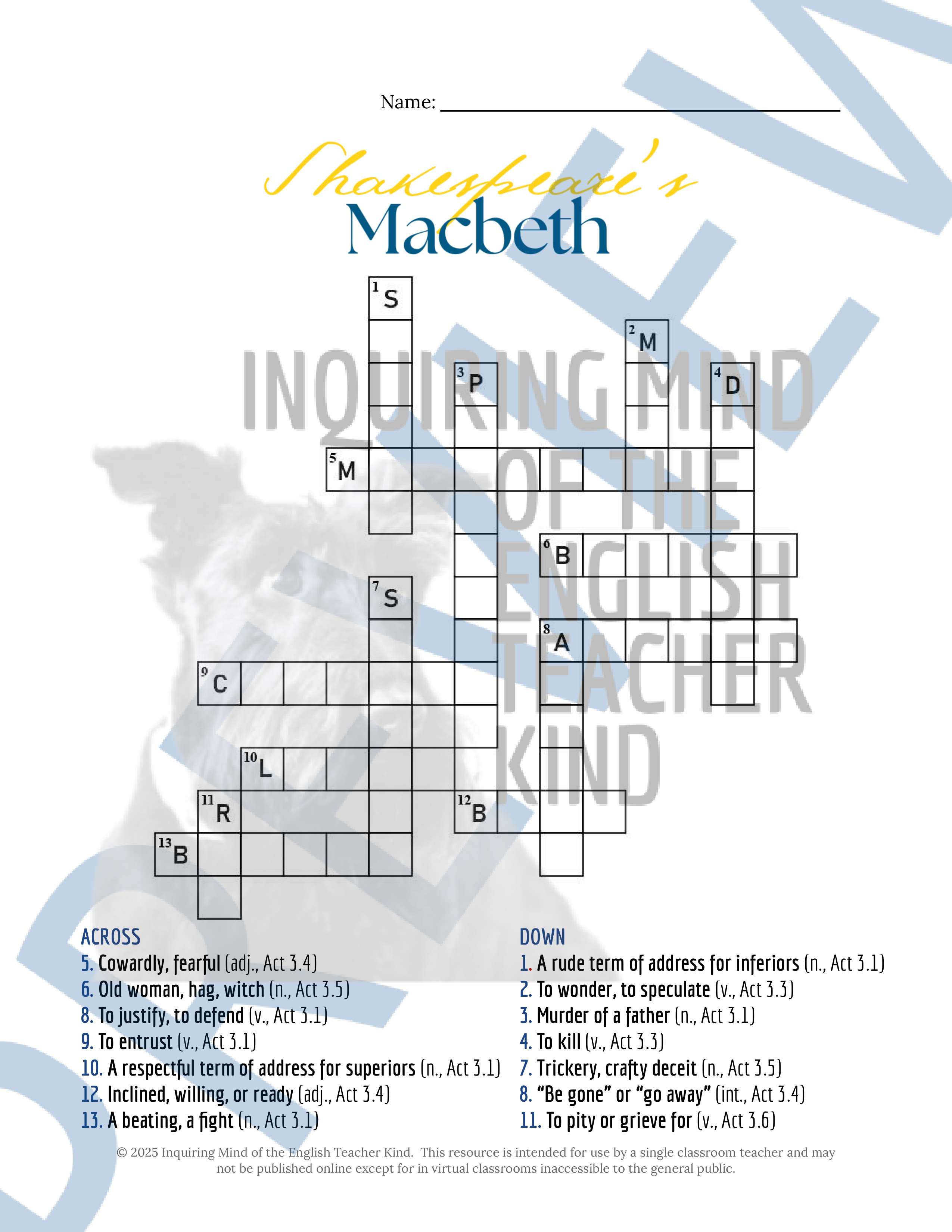

Support vocabulary development and enhance reading comprehension with this set of games and activities to complement Act 3 of William Shakespeare’s Macbeth. A vocabulary application worksheet, a crossword puzzle, a word search game, and answer keys are included. Materials are delivered in editable Word Document and printable PDF formats.
Specifically, the following vocabulary terms are addressed: abide, affliction, avaunt, avouch, barren, beldam, bent, bestow, buffet, commend, dispatch, fitful, glare, liege, marrowless, muse, parricide, pious, rebuke, rue, saucy, sirrah, sleight, and treachery.
By engaging with these activities, students will:
- Determine the meaning of unfamiliar and complex words
- Consult reference materials in order to learn and verify word meanings
- Discern the most proper application of words as they are used in sentences
Get this resource as part of a bundle and save up to 16%
A bundle is a package of resources grouped together to teach a particular topic, or a series of lessons, in one place.
Macbeth Vocabulary Games Bundle (Crossword Puzzles, Word Searches, and Application Worksheets)
Help high school students navigate William Shakespeare's language with these vocabulary games and activities to facilitate comprehension of *Macbeth*. Alternatively, stash these materials in an emergency sub folder to keep students meaningfully engaged in the book during unexpected teacher absences. Included are 5 vocabulary application activities, 5 crossword puzzles, 5 word search games, and answer keys. Materials delivered in editable Word Document and printable PDF formats. A total of 121 words are addressed: abide, abjure, affliction, anon, appease, arbitrate, avaricious, avaunt, avouch, aweary, bait, bane, barren, beldam, benison, bent, bestow, blaspheme, boast, bodement, bough, brainsickly, broil, buffet, chastise, cherubin, clamor, commend, compunctious, concord, consort, deftly, desolate, dispatch, doff, dun, entreat, ere, fain, false, fantastical, firstling, fitful, foison, fry, gild, glare, gout, groom, harbinger, haste, hew, hie, holily, homely, hurly-burly, husbandry, implore, impress, incarnadine, industrious, infirm, intrenchant, kern, largess, liege, lily-livered, loon, malice, marrowless, metaphysical, mettle, mortal, mortified, multitudinous, muse, naught, obscure, pain, palpable, parricide, perchance, perilous, pernicious, pine, pious, posset, prithee, prowess, purgative, quarrel, quoth, rabble, rapt, raze, rebuke, reign, relish, repose, rue, saucy, scarcely, shadow, sirrah, sleight, spongy, stanchless, stealthy, stern, suborn, summon, swift, tarry, thither, thriftless, timely, toil, treachery, unrough, verity, and woeful. By engaging with these activities, students will: * Determine the meaning of unfamiliar and complex words * Consult reference materials in order to learn and verify word meanings * Discern the most proper application of words as they are used in sentences
Macbeth Act 3 Quiz, Close Reading Analysis Worksheets, and Vocabulary Activities
Evaluate general reading comprehension and support the development of critical thinking and craft analysis skills with this bundle of formative assessments covering Act 3 of William Shakespeare's *Macbeth*. A plot-based quiz, six close reading worksheets (one per scene), a vocabulary application activity, a crossword puzzle, a word search game, and answer keys are provided. Materials are delivered in editable Word Document and printable PDF formats. By engaging with these activities, students will: * Identify what the text states both explicitly and implicitly * Define challenging words as they are used in the text * Explore cause-and-effect relationships * Discern tone in context * Determine the function of given details * Examine how characters think, behave, interact, and develop * Compare characters in the play * Analyze Shakespeare's incorporation of religious imagery to articulate what it implies about Macbeth * Apply knowledge of literary devices such as allusion, metaphor, euphemism, hyperbole, allusion, callback, situational irony, and more * Consider the symbolism of sleep, diamonds, and an extinguished light in context * Make logical inferences about Elizabethan culture and its perspective on the supernatural * Support inferences and claims with sound reasoning and relevant evidence * Write about Shakespearean drama with clarity, accuracy, and precision
Something went wrong, please try again later.
This resource hasn't been reviewed yet
To ensure quality for our reviews, only customers who have purchased this resource can review it
to let us know if it violates our terms and conditions.
Our customer service team will review your report and will be in touch.